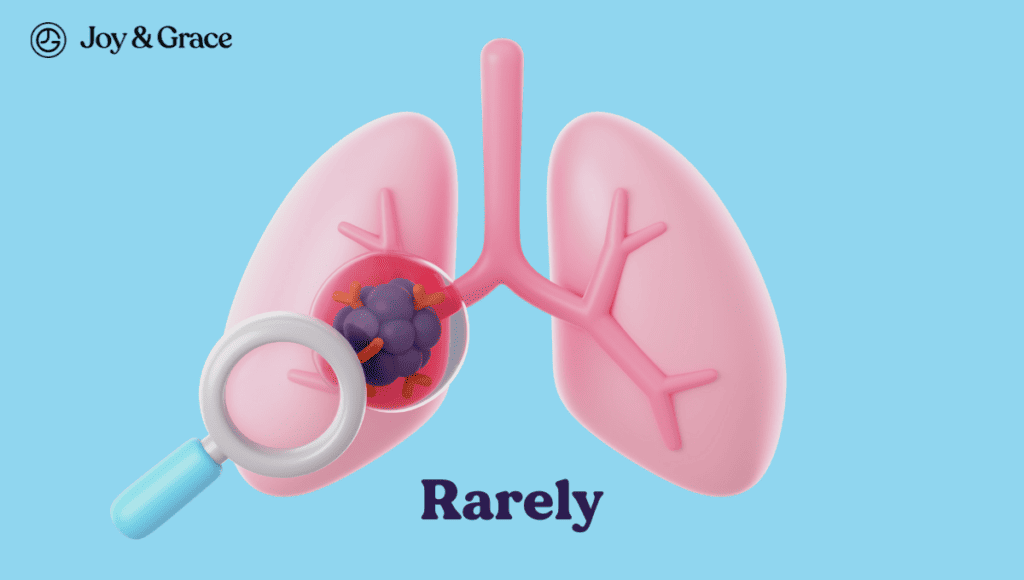Many of us have experienced the discomfort of a persistent cough or the ache of shoulder pain. But few would actually suspect a link between the two. What if we told you this link may not be a coincidence at all?
Coexisting shoulder pain and coughing might be harmless. However, they may also suggest the presence of something significant. Join us as we dive into the topic to solve this seemingly mysterious connection.
What Does It Mean When I Cough and My Shoulder Hurts?
At first glance, a cough and shoulder pain may seem like symptoms that just so happen to appear together at times. The truth is, they could be linked to each other.
A hurtful shoulder associated with a cough can mean any of the following causes:
- A shoulder injury (the most likely cause)
A shoulder injury can result from the forceful movements during the cough itself! While you’re coughing, the pressure inside your body increases rapidly in order to expel air quickly. Your body experiences a sudden, forceful strain. The strain may directly damage your shoulder muscles (along with your chest and abdominal muscles). As a consequence, shoulder pain may occur. This quick increase in pressure is thanks to the muscles in different parts of the body that activate to make coughing happen.
Additionally, if you have a mild shoulder injury you might not be aware of, and coughing can worsen it due to the extra strain. - An upper respiratory infection
Coughing and shoulder pain may appear together as symptoms of breathing tract infections. These often present with frequent coughing or sneezing. They’re also associated with a weakened immune system, fatigue, and body aches, including the shoulder.
- Lung disorders
Coughing is our body’s natural defense against irritants entering the breathing tract. However, when it’s linked to shoulder pain, it may also indicate an existing disease.
A cough is a common symptom of lung disorders. Lung disorders that may lead to coughing and shoulder pain include:
-
- A lung tissue infection (pneumonia)
- Pleurisy (inflammation of the lung lining, known as the pleura)
- A lung tumor or lung cancer (the least likely cause)
- Stomach problems, such as reflux disease (GERD)
Gastro-esophageal reflux disease (GERD) is when acid from the stomach leaks into the esophagus. It may cause coughing at night and heartburn, which may spread to the shoulder.
Would it be right to assume that your shoulder pain will always go along with a cough? Certainly not!
A painful shoulder can come as a result of many disorders and injuries. It’s, after all, one of the most common musculoskeletal complaints worldwide. We highly recommend you consult your doctor, especially if your pain goes along with coughing.
How Do I Know if My Shoulder Pain is Lung-Related?
If you suspect your shoulder pain and cough are lung-related, you should first and foremost address your complaints. Consulting your doctor is the only way to confirm a lung-related diagnosis. Your doctor may ask you a few questions, perform examinations, and order tests to find the root of your symptoms.
The shoulder is tightly interconnected with its surrounding regions, like the chest, neck, or abdomen. Pain from these regions may spread to the shoulder, giving rise to shoulder pain.
Pain originating in one area but being felt in another is referred to as pain. Referred pain may arise from a mistake in how your nervous system handles nerve signals. In this sense, pain impulses from the lungs may sometimes be perceived as referred shoulder pain.
Lung-related shoulder pain typically accompanies other lung disease symptoms. The lung disorders that we listed can manifest in different ways. Let’s discuss them shortly, one by one.
Pneumonia: Can a Lung Infection Cause Shoulder Pain?

Pneumonia is the inflammation of the lung, which usually arises from a lung infection. It’s characterized by many symptoms, which typically go away within a month (with antibiotics).
Shoulder pain is considered a more unusual (but totally plausible) symptom of pneumonia.
More vulnerable groups may experience more severe bouts of lung infections. They include:
- Babies,
- The elderly,
- Immunocompromised (weakened immune system) people
That said, shoulder pain is rarely the sole symptom of pneumonia, as pneumonia causes many symptoms.
What Are the Symptoms of Pneumonia?
The main symptoms of pneumonia include the following:
- A persistent cough with yellow or green mucus
- Chest pain that spreads to the back and shoulders
- Breathlessness
- High fever
- Feeling tired and unwell
- Wheezing breath noises
- Loss of appetite
Is It Normal to Have Shoulder Pain With Pneumonia?

As mentioned, shoulder pain is a rather atypical symptom of pneumonia. According to studies, pneumonia should be considered a potential cause when dealing with shoulder pain.
- Shoulder pain can occur as referred pain when there’s damage to the nerves supplying the layers covering the lungs. This health condition is known as pleurisy. Pneumonia is one of the most common causes of pleurisy.
- Shoulder pain can also arise from an injury to the phrenic nerve. This nerve supplies the diaphragm, a large muscle that’s vital for breathing.
- As we discussed, forceful movements during coughing can also cause shoulder pain. Pneumonia can manifest with an especially vicious, deeper, and louder cough that may hurt the shoulder.
What Happens if I Don't Treat Pneumonia?
Many people tend to neglect their pneumonia symptoms, following the old saying, “It’ll pass.” Untreated pneumonia may be life-threatening as it may spread to large areas of the lungs. If it’s allowed to spread, it may seriously affect lung function.
Here are some alarming signs that should prompt you to seek medical attention immediately:
- Your cough persists for more than three weeks
- You cough up blood
- You can’t breathe properly
- Your chest pain gets intense
- You feel increasingly confused, frustrated, or irritated
- You have pale or blueish skin, lips, or tongue
Lung Cancer and Shoulder Pain: Is There a Connection?
Lung cancer is a rare but dangerous tumor that develops in the lung. A constant cough almost always characterizes it. Shoulder pain, on the other hand, usually signals the presence of a muscular or joint problem.
It’s typically not a sign of a lung tumor, but it may indeed be associated with it sometimes. And by “sometimes,” we mean “very rarely.” However, severe shoulder pain should raise an eyebrow. Let’s elaborate.
What Kind of Cancer Causes Shoulder Pain?
Although very rarely seen as a presenting sign, various lung cancers can still lead to shoulder pain as the disease progresses. However, remember that other symptoms usually appear before the onset of shoulder pain.
There is one exception to this rule, though: a tumor called the Pancoast tumor.
This particular tumor develops at the apex, or top, of the lung. Because it’s close to the shoulder, it may spread to it or damage a nerve, causing severe shoulder pain.
Pancoast tumors are very rare. They are thought to affect about three in 100,000 individuals. Also, fewer than 5 in every 100 cases of lung cancer (5%) are Pancoast tumors. It’s rarely seen in people under 45.
Other lung tumors may also compress nearby nerves that send fibers toward the shoulder region. In more advanced cases, they might cause shoulder pain by metastasizing (spreading) to tissues or bones near the shoulder joint. Here, we can mention:
- Squamous cell carcinoma (SCC)
SCC develops in the cells that line the airways (bronchi).
- Adenocarcinoma
This type grows in the mucus-producing cells that line the air sacs (alveoli).
- Large cell carcinoma (LCC)
LCC develops in large cells in any part of the lungs.
Another essential thing to mention is who might have the highest risk of developing lung cancer. The most significant risk factors for lung cancer are:
- Smoking tobacco in any form
- Having a history of smoking, even if you've quit
- Living with or having frequent contact with someone who smokes
- Working in an environment where people smoke
- Having other relatives with lung cancer
- Exposure to radon, chromium, nickel, soot, tar, or arsenic
When is Shoulder Blade Pain a Sign of Lung Cancer?

As we mentioned, shoulder and shoulder blade pain often arises from muscle and bone problems. Nevertheless, they might, on extremely rare occasions, hint at an existing tumor.
Shoulder pain is one of the characteristic signs of Pancoast tumors. These tumors also present with arm pain and the so-called Horner’s syndrome triad:
- A droopy eyelid
- A small pupil in one eye
- Loss of sweating on one side of the face
The other cancer types that we mentioned can cause shoulder pain when they spread from the lung tissue. Their characteristic symptoms include the following:
- A new cough or persistent cough
- A bloody cough
- Breathlessness
- Chest pain that spreads and worsens with coughing, breathing, or laughing
- Losing weight and appetite
- Feeling tired all the time
Can Lung Cancer Start With Shoulder Pain?

Lung cancers commonly start with a cough that doesn’t go away or worsens. The cough may precede other symptoms, such as chest and shoulder pain.
However, there’s one exception to this general rule. We talked about it earlier: Pancoast tumors.
A Pancoast tumor can first present with severe shoulder pain. In fact, 96% of patients diagnosed with a Pancoast tumor complain of shoulder pain as their first symptom.
These might be extra reasons for you not to ignore your pain. If you’re having doubts, don’t hesitate to seek help from your doctor.
What Does Shoulder Pain From Lung Cancer Feel Like?
Lung cancer-associated shoulder pain may involve the shoulder and shoulder blade regions. It might spread to the neck and arm, especially if it’s nerve-related.
Shoulder pain may go along with neurological symptoms that involve neighboring regions. These symptoms may come in the form of:
- Numbness
- Weakness
- Tingling
About Pleurisy and Shoulder Pain
Pleurisy is the inflammation of the thin layers lining the lungs. That definition surely rolls off the tongue! The layers that cover the lungs are known as the pleurae.
Pleurisy usually presents with a cough and sharp chest pain, which worsens when breathing in. The chest pain may also spread to the neck and shoulder, resulting in pain in these areas. The related nerve irritation from the inflammation can explain this link.
Pleurisy is most commonly caused by a viral or bacterial infection (pneumonia). Lung cancer may also lead to pleurisy (and shoulder pain).
Does Pleurisy Go Away?
Pleurisy originating from a viral infection may resolve by itself! Generally speaking, though, treatment for pleurisy may be necessary. It involves fighting the underlying cause and managing the symptoms. For example, in the case of pneumonia, your healthcare provider will prescribe antibiotics.
The pain associated with pleurisy can be managed with over-the-counter medicines. The most popular options are Tylenol (paracetamol) and Ibuprofen (and other NSAIDs).
Takeaway
Coughing and shoulder pain could be linked to each other.
A hurtful shoulder associated with a cough usually means you have a shoulder injury.
When it’s linked to shoulder pain, a cough may also hint at an existing lung disorder, such as pneumonia or cancer.
Shoulder pain can occur as referred pain from the chest.
Shoulder pain may also accompany damage to the nerves supplying the pleurae. This medical condition is known as pleurisy. Pneumonia is one of the most common causes of pleurisy.
A Pancoast tumor is a rare type of lung tumor that can present with severe shoulder pain.
You should address your complaints if you suspect your shoulder pain and cough are related. A consultation with a medical professional is the only way to confirm a lung-related diagnosis.















